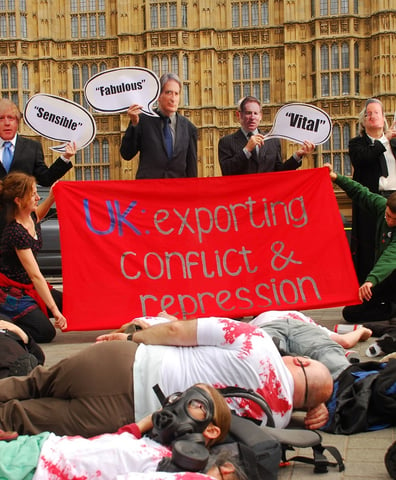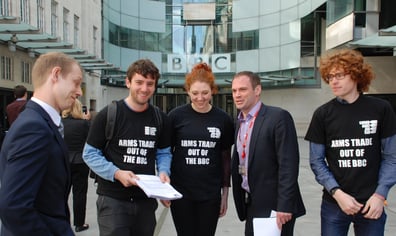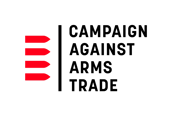About us
Who we are
Campaign Against Arms Trade (CAAT) is a UK-based organisation working to end the international arms trade.
The arms business has a devastating impact on human rights and security, and damages economic development. Large scale military procurement and arms exports only reinforce a militaristic approach to international problems.
In seeking to end the arms trade, CAAT's priorities are
to stop the procurement or export of arms where they might:
- exacerbate conflict, support aggression, or increase tension
- support an oppressive regime or undermine democracy
- threaten social welfare through the level of military spending
- to end all government political and financial support for arms exports
and to promote progressive demilitarisation within arms-producing countries.
CAAT considers that security needs to be seen in much broader terms that are not dominated by military and arms company interests. A wider security policy would have the opportunity to reallocate resources according to actual threats and benefits, including addressing major causes of insecurity such as inequality and climate change.
CAAT values the diversity of opinion amongst its supporters and is committed to nonviolence in all its work.
CAAT was awarded the Right Livelihood Award, the Alternative Nobel Prize, in 2012 for innovative and effective campaigning against the global arms trade.
How we are organised
CAAT has a non-hierarchical staffing structure. The ultimate decision-making body is its Steering Committee. It employs a team of paid staff to oversee the day-to-day running of the campaign. They are supported by volunteers, without whom the campaign would not be able to function. Volunteers carry out a variety of tasks including helping with mail-outs, research, website maintenance and administration.
CAAT also has a network of local groups and contacts who play a vital role in communicating its message and strengthening its campaigns. CAAT's networks reflect the interest of particular groups of supporters at any given time.
How we are funded
Donations from individual and group supporters make up about 60% of CAAT's income and are always gratefully received. As a campaigning organisation, CAAT is unable to take advantage of many of the benefits open to charities, but makes applications for charitable funding to a small number of trusts and foundations for its research and educational work.
Our culture and values
Our Values
How we work is as important as what we are working for. Our values shape the way we work to achieve our goals.
WE ARE RADICAL
We work for the abolition of the arms trade and the systems of power that it is part of. In pursuit of this, we support meaningful steps towards reducing its worst harms. We are bold and forthright in creatively challenging power, working to overturn the multiple and overlapping forms of oppression that the arms trade reinforces.
WE STAND AND ACT IN SOLIDARITY
We seek to be guided by the voices of people affected by the arms trade and use our influence to amplify them.
We believe our movement is strongest when we are open to learning from others, and work to build alliances to fight oppression together. We strive to be anti-racist and anti-oppressive and to challenge ourselves on privileges we hold, especially those that perpetuate the systems of injustice we are working to abolish.
WE WORK WITH INTEGRITY
Our credibility comes from the rigour and accuracy of our research, actions and communication. We promote transparency and collaboration through sharing our analysis, data and skills.
WE WORK AGAINST HIERARCHY
We seek to identify, challenge and work against the formal and informal power structures that exist within our society and inside our organisation. We distribute power and leadership by engaging openly and welcoming contributions from everyone, working to reach a consensus when making a decision.
We value a diversity of experience and expertise and prioritise creating space in our movement for those whose voices have historically been ignored or marginalised. We seek to reflect our non-hierarchical values by ensuring that all involved in CAAT are treated with equal respect and that their voices are fully heard and considered.


.jpg)

